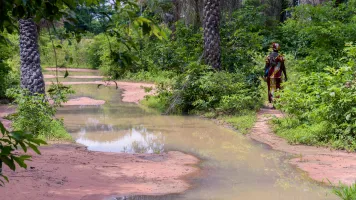The world is acknowledging climate change and the need to mitigate, build resilience, and adapt. We have the technology solutions needed to understand the changes, calculate the risks, ensure adaptation, and measure the impact of mitigation. However, without trust in the technology, trust among partners, and trust in the arising decisions, human barriers can derail the benefits of these technological advances.
The Global Partnership for Sustainable Development Data, Space4Climate and the UK Space Agency International Partnership Programme brought together technology experts and data ethics practitioners from over ten countries in the midst of COP26 to discuss the challenges and opportunities of local data-driven climate action. Here’s some of the key takeaways from the discussion:
1. Data as a tool for change, but only if communities are equipped with the right skills and knowledge
Many communities in different contexts across the globe face significant barriers in using data and technology for targeted climate action.
This is particularly true of remote communities, who often rely on the land for their livelihoods and have less digital infrastructure to access environmental information. Lilian Looloitai works with pastoral Maasai communities in Tanzania. Some of the questions around using data in the fight against the impacts of climate change her community continues to grapple with are: What kind of data do we need? When and how do I collect it? How do I store it?
“It is so difficult for us to understand how we can draw our future when it comes to issues related to climate change, when we lack the capacity to handle the problems we are facing right now.”
Lilian Looloitai, Executive Director, Community Research and Development Services Limited
Building skills and capacity is critical for building trust in new technology solutions so that end users can understand the relevance, applicability, and quality of the information at hand.
Supporting a cultural shift in public institutions to use non-traditional data has been at the heart of Dao Khanh Tung’s work forecasting dengue fever outbreaks in Vietnam. His team is combining big data with dengue incidence rates to identify the likelihoods of outbreaks one to six months in advance. This work informs public policy, prevention, and action. Building institutional and individual capacity was critical for building trust in the insights being generated.
“End users will be reluctant to expend resources on prevention of an outbreak such as spreading community awareness, unless forecasts are telling them sufficiently accurate information at a suitable spatial resolution.”
Dao Khanh Tung, Programme Officer, UN Development Programme & UKSA International Partnership Programme project (D-MOSS) representative
In Colombia, space technology is helping local farmers to improve productivity and monitor crop losses. Working closely with local communities helps unpack and prioritize related issues such as food security, water conservation, and job opportunities. The resulting technology solution helps local farmers develop a holistic view of how climate change impacts their livelihoods in real time. “Everything is connected,” said José Francisco Zúñiga Cotes.
José Francisco Zúñiga Cotes, Executive President, Association of Banana Growers of Magdalena and La Guajira & UKSA International Partnership Programme project (EO4cultivar) representative
2. Ensuring more flexible funding frameworks
Helping local actors use technology to fight climate change requires investment in digital infrastructure, skills, and institutional mechanisms that allow data to be translated into action. This investment should be flexible so that efforts are resilient to any barriers or disruption, such as pervasive inter-agency silos or political instability.
Uma Kandalaeva reflected on her work in Kyrgyzstan understanding pasture degradation, as an example of an innovative technology solution that could only take root with an intensive capacity building program. The COVID-19 pandemic posed significant issues for access to the pasture committees and end users. Watch Uma reflect on how her team trained a first cohort of professionals, who are key to using and replicating the technology in the future, despite significant program disruption.
Uma Kandalaeva, Kyrgyzstan Country Director, Mercy Corps & UKSA International Partnership Programme project (SIBELIUs) representative
There needs to be as much focus on investment in people and skills as there is in the technology itself. Yuliya Petsyk has seen time and time again how prioritizing technology results in solutions that are not used in the long term, and points to the fact that Ethiopia has 64 early warning systems.
She suggested: “The larger issue is coming up with funding frameworks that would be more democratic and resilient… maybe this is where donors have to be more proactive in ensuring that their work can last for years.”
Yuliya Petsyk, Research Consultant, International Research Institute for Climate and Society, Earth Institute, Columbia University
In-depth local and user engagement is crucial to designing solutions that have local ownership and survive beyond initial funding. The UK Space Agency takes this to heart while developing international partnerships to fight climate change. CEO Paul Bate commented: “We clearly need a global dialogue with the end users, the people who will use the information to make decisions in their area, their country, or their business. We need to understand what they need and design services accordingly.”
3. Getting the right stakeholders at the table
Building trust with local communities and users of technology solutions takes time and effort, but is worthwhile. Investing in relationships and bringing the right stakeholders to the table enables technology solutions to be designed for local needs, the insights can be validated by those closest to the changes on the ground, and any arising decisions incorporate the voices of the most affected communities.
Yakubu Mohammed is from Ghana's National Forestry Commission and worked on the Forests 2020 Project funded by the UK Space Agency's International Partnerships Programme. He pointed to a success story where his team engaged local communities in tackling deforestation in Ghana. The communities helped to validate results and build trust in the technology solutions. “They look at the map and tell us whether the map fits the realities on the ground. They are in direct contact with the resources and any changes that occur; they’re the first to have the information,” Yakubu said.
Ana Patrícia Graça talked about the intersection of data, human rights and vulnerability, highlighting the power of data to elevate the voices of marginalized communities. She said: “Data is a powerful tool to incorporate the voices of those communities and those most impacted by climate change… it’s part of a process that needs ownership from these communities so they can be the first ones to act upon it and convince others to do something also.”
Ana Patricia Graca, UN Resident Coordinator, Cabo Verde
Meanwhile in Vanuatu, Frédéric Petit explained his work helping the small island developing state meet its ambitious renewable energy targets. Understanding local priorities now and in the future is critical for designing programs that create equitable access to renewable energy for all and minimize the potential for local conflict down the line.
Frédéric Petit, Director of Development, UNELCO ENGIE & UKSA International Partnership Programme project (RE-SAT) representative
Still, it’s one thing to get the right stakeholders to the table, but how do we describe the way the different voices are integrated in different levels of decision-making? Andrew Kruczkiewicz reflected on this question. He believes that the convening voice and who has the final say is even more important than getting the right people to the table.
Andrew Kruczkiewicz, Senior Staff Research Associate, International Research Institute for Climate and Society, Earth Institute, Columbia University & Science Advisor, Red Cross Red Crescent Climate Centre
4. Better understanding around the ethical complexities and action on setting standards
Information governance is not just a technical consideration. It is also a political consideration when deciding whose voices are counted as evidence and who has access to information on natural resources.
As Jillian Schacher pointed out, accidentally providing data in a harmful way can have huge ethical ramifications for the communities involved. This could result in one group using information to disadvantage another group, causing conflict over land and resources.
Jillian Schacher, Postgraduate Researcher, University of Leeds
Fair information governance can only be achieved with a structured approach to local stakeholder engagement. This is a strategy Batbuyan Batjav deployed in working with pastoral communities in Mongolia. While satellite data can pinpoint good pastureland, this can also cause conflict among the pastoral communities. Batbuyan says: “They needed regulation of stakeholders who had accreditation for how to use this source of information.”
Batbuyan Batjav Researcher, Center for Nomadic Pastoralism Studies & UKSA International Partnership Programme project (SIBELIUs) representative
Standards are a key mechanism for guaranteeing that technology solutions are locally appropriate. Without such a standard, anyone can produce a solution using any data they wish, make it available for free or at a cost, for anyone else to use or to base decisions on. “Some decisions could affect the livelihoods of many people, often vulnerable populations, or could involve large sums of investment that could be misspent,” added Murray Dale.
While these standards are already being developed in the UK for the UK Met Office under the Climate Resilience Programme, the principles and basis of these standards can have applications on an international or global scale in the future.
Murray Dale, Technical Director, JBA Consulting
The way forward
There is no shortage of data and technology solutions that can (and are) unlocking the value of data for climate action. We need to focus on moving to a place where data is not just being generated, but used to inform action. We need to avoid overabundant technology solutions that have limited use, like Somalia’s 64 early warning systems. To achieve this, solution design must suit the local context, local views should count as evidence to inform interventions and local communities need convening power to make decisions based on the arising insights.
Want to find out more? Watch the full discussion, explore more in our report and read about the International Partnership Programme: Space Solutions for Development.
This blog was developed by the Global Partnership for Sustainable Development Data, Space4Climate and the UK Space Agency International Partnerships Programme.

